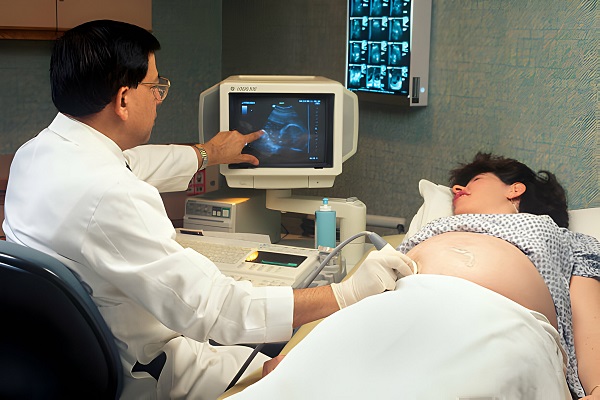Ultrasounds in pregnancy are essential for monitoring fetal development and detecting any potential concerns. During ultrasounds, expect to see images of your baby and hear their heartbeat, providing valuable information for your healthcare provider.
These non-invasive imaging tests use sound waves to create a visual of the fetus inside the womb, allowing for a closer look at growth and identifying any issues early on. Understanding the role of ultrasounds can help alleviate anxiety and ensure proper care throughout your pregnancy journey.
Let’s delve deeper into what to expect during ultrasounds and how they contribute to the health of both you and your baby.

Discover More – Creating Your Birth Plan: Options And Considerations
The Basics Of Ultrasounds In Pregnancy
Discover the role of ultrasounds in pregnancy and what to expect during the procedure. Ultrasounds provide valuable insight into the baby’s development, allowing parents to see their little ones and monitor their growth and health throughout the pregnancy. It’s a non-invasive and essential part of prenatal care.
Ultrasounds are a vital part of prenatal care, allowing healthcare providers to monitor the development and well-being of the fetus. This non-invasive imaging technique uses sound waves to create images of the uterus, placenta, and baby. Understanding the basics of ultrasounds in pregnancy can help expectant parents feel more informed and prepared for their prenatal appointments.
The Purpose Of Ultrasounds
Ultrasounds serve several important purposes during pregnancy. Firstly, they can confirm the pregnancy and determine the gestational age, helping healthcare providers calculate the due date accurately. Additionally, ultrasounds are used to assess the growth and development of the baby, ensuring that everything is progressing as expected.
Moreover, ultrasounds can detect any potential abnormalities or complications, such as structural defects or issues with the placenta. They also enable healthcare providers to monitor the baby’s position and determine the number of fetuses present in the uterus, particularly in the case of multiple pregnancies.
When Ultrasounds Are Typically Performed
The timing of ultrasounds during pregnancy can vary depending on individual circumstances and healthcare protocols. However, there are standard points in the pregnancy journey when ultrasounds are typically performed.
| Trimester | Timing | Purpose |
|---|---|---|
| First Trimester | Between 6 and 9 weeks | Confirm pregnancy and gestational age |
| Second Trimester | Between 18 and 20 weeks | Assess fetal anatomy and screen for any abnormalities |
| Third Trimester | Between 32 to 36 weeks | Monitor fetal growth and position, assess placenta health, and evaluate amniotic fluid levels |
It’s important to note that additional ultrasounds may be performed if there are specific concerns or complications identified during the pregnancy. Your healthcare provider will discuss the recommended ultrasound schedule with you based on your individual situation.
Understanding the basics of ultrasounds in pregnancy can alleviate any apprehensions and ensure that expectant parents are fully informed about their baby’s development. The purpose of ultrasounds extends beyond simply seeing baby’s first images; they play a crucial role in monitoring the health and well-being of both the mother and the baby throughout the entire pregnancy journey.
Types Of Ultrasounds During Pregnancy
Ultrasounds are crucial in monitoring the progress of a pregnancy. There are different types of ultrasounds that may be performed during pregnancy to ensure the health and well-being of both the mother and the baby.
Transabdominal Ultrasound
This type of ultrasound is commonly used during pregnancy. It involves a transducer being moved over the abdomen to generate images of the fetus.
Transvaginal Ultrasound
This type of ultrasound is performed by inserting a transducer into the vagina to obtain clearer images of the early stages of pregnancy.
Discover More – Baby on Board: Travel Tips for Pregnant Women
Benefits And Risks Of Ultrasounds
Benefits of Ultrasounds
- Ultrasounds provide valuable insights into the developing fetus.
- They aid healthcare providers in monitoring the baby’s growth and well-being.
- These imaging techniques can detect potential abnormalities early on.
- Expectant parents can bond with their baby by seeing it on the screen.
Risks and Considerations
- Routine use of ultrasounds without medical necessity is discouraged.
- Excessive exposure to ultrasounds can raise concerns due to heating effects.
- Pregnant women should ensure ultrasounds are performed by trained professionals.
- Discuss any concerns with your healthcare provider to make informed decisions.
What To Expect During An Ultrasound
During an ultrasound, expect to see detailed images of your baby’s development and hear their heartbeat. This non-invasive procedure helps monitor the health of the baby and detect any potential complications during pregnancy.
Preparation For The Ultrasound
Before your ultrasound appointment, there are a few things you can do to prepare and ensure the process goes smoothly. One important step is to drink plenty of water and stay hydrated. A full bladder helps the ultrasound technician get a clearer image of your uterus and the baby. Additionally, it’s a good idea to wear loose-fitting, comfortable clothing that can easily be lifted or removed to expose your abdomen.
What Happens During The Ultrasound
The ultrasound itself is a painless and non-invasive procedure that typically lasts between 20 to 30 minutes. You will lie down on a comfortable table while the technician applies a warm gel to your belly. This gel helps the ultrasound probe slide easily over your skin and improves the quality of the images. The technician will then gently move the probe around your abdomen, capturing images of your baby and various structures within the uterus.
During the procedure, you will be able to see the images of your baby on a monitor. The technician will point out different features and measurements, such as the baby’s heartbeat, size, weight, and position. It’s an exciting and emotional moment for many parents-to-be as they catch their first glimpses of their little one.
If your ultrasound is focused on a specific concern or issue, the technician may need to take additional measurements or images. They will carefully explain any abnormalities or concerns they observe and answer any questions you may have. It’s important to keep in mind that the technician may not be able to provide a definitive diagnosis and that further medical evaluation may be necessary.
After the ultrasound is complete, the technician will wipe off the gel from your belly, and you can go back to your normal activities. Often, you will receive a copy of the ultrasound images to take home as a keepsake and share with your loved ones. Remember, the purpose of an ultrasound is to monitor the health and development of your baby throughout the pregnancy. It provides valuable insights and reassurance for both you and your healthcare provider.
Understanding what to expect during an ultrasound can help alleviate any anxieties or concerns you may have. By adequately preparing for the appointment and knowing what happens during the procedure, you can focus on the excitement of seeing your baby and gathering essential information about their growth and development.

The Results Of Ultrasounds
Explore the significance of ultrasounds during pregnancy to understand fetal development and monitor health. Ultrasound results provide valuable insights into the baby’s growth, overall well-being, and help anticipate any potential concerns. Get ready to witness the beauty of this non-invasive and essential prenatal tool.
Interpreting Ultrasound Images
The Role of Ultrasounds in Pregnancy: What to Expect
Ultrasounds are an essential part of prenatal care, providing valuable insight into the well-being and development of the growing baby. As an expectant parent, understanding the results of ultrasounds can bring peace of mind and help anticipate any potential concerns. Here, we will delve into the significance of interpreting ultrasound images, as well as the common findings to anticipate during this pivotal stage of pregnancy.
Common Findings and Their Significance
Growth and Development: During an ultrasound, the healthcare provider assesses the baby’s growth and development, ensuring that they are reaching their milestones. Any discrepancies in size or development may warrant further investigation and monitoring.
Placental Health: The ultrasound also offers a glimpse into the health of the placenta, a vital organ that supplies the baby with nutrients. Any issues with the placenta could impact the baby’s well-being, making it critical to monitor its health through regular ultrasounds.
Anatomy Scan: Around 20 weeks, an anatomy scan showcases the baby’s vital organs and structures. This comprehensive assessment ensures that everything is developing as expected and can help detect any potential abnormalities.
Amniotic Fluid Levels: The amount of amniotic fluid surrounding the baby is crucial for their protection and development. Ultrasounds can detect any deviations in the fluid levels, which may indicate potential concerns for the baby’s well-being.
By being aware of these common findings and their significance, expectant parents can gain a deeper understanding of the valuable information provided by ultrasounds. This knowledge can empower them to ask informed questions and actively participate in their prenatal care journey.
Discover More – The Importance of Prenatal Care: Your Guide to Doctor Visits
Frequently Asked Questions
What Is The Purpose Of An Ultrasound During Pregnancy?
Ultrasounds are used to monitor fetal growth, check for abnormalities, and determine the baby’s gender.
When Is The Best Time To Have An Ultrasound During Pregnancy?
The first ultrasound is typically done around 8-12 weeks to confirm the due date and detect any potential issues.
How Many Ultrasounds Are Recommended During A Normal Pregnancy?
Most pregnant women have at least two ultrasounds, one in the first trimester and another between 18-22 weeks.
Are Ultrasounds Safe For The Baby During Pregnancy?
Yes, ultrasounds are considered safe and do not have any known harmful effects on the baby or the mother.
Can Ultrasounds Accurately Predict The Baby’s Due Date?
Ultrasounds are an accurate way to estimate the baby’s due date based on the baby’s size and growth.
Is A Full Bladder Necessary For An Ultrasound During Pregnancy?
Having a full bladder can improve the quality of the ultrasound images, especially in the early stages of pregnancy.
Conclusion
Ultrasounds play a crucial role in monitoring the progress and well-being of your baby throughout pregnancy. From confirming your pregnancy to helping identify any potential concerns, ultrasounds provide valuable insights for healthcare professionals and expectant parents. With advancements in technology, experiencing the joy of seeing your baby on the screen has become increasingly common.
By understanding what to expect during ultrasounds, you can fully embrace this exciting and transformative journey of pregnancy.


